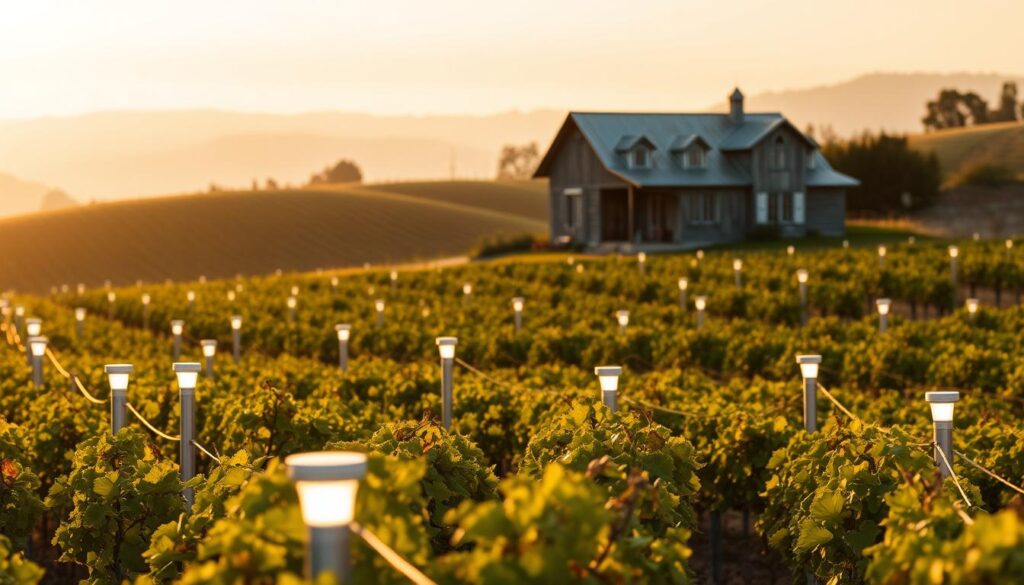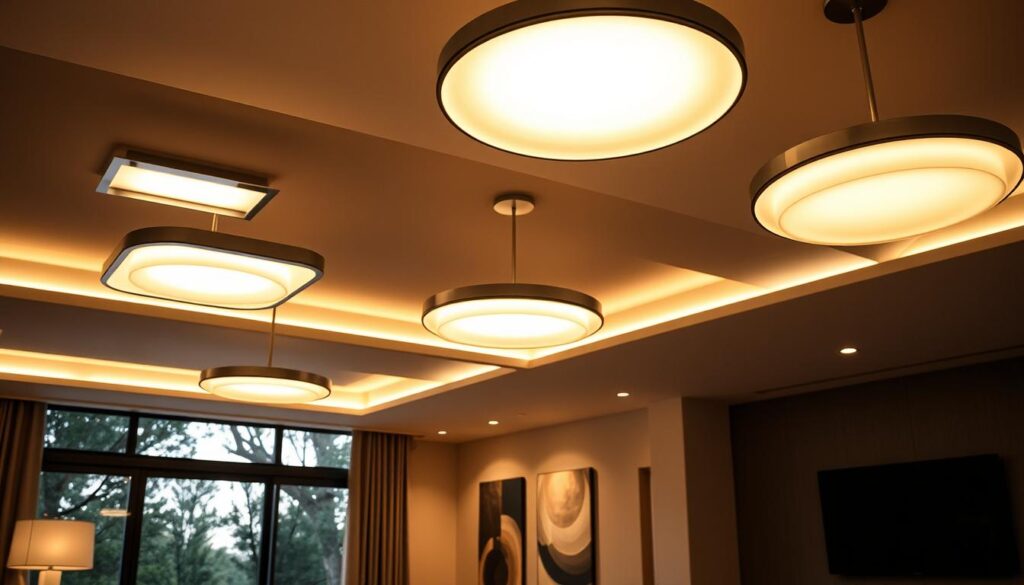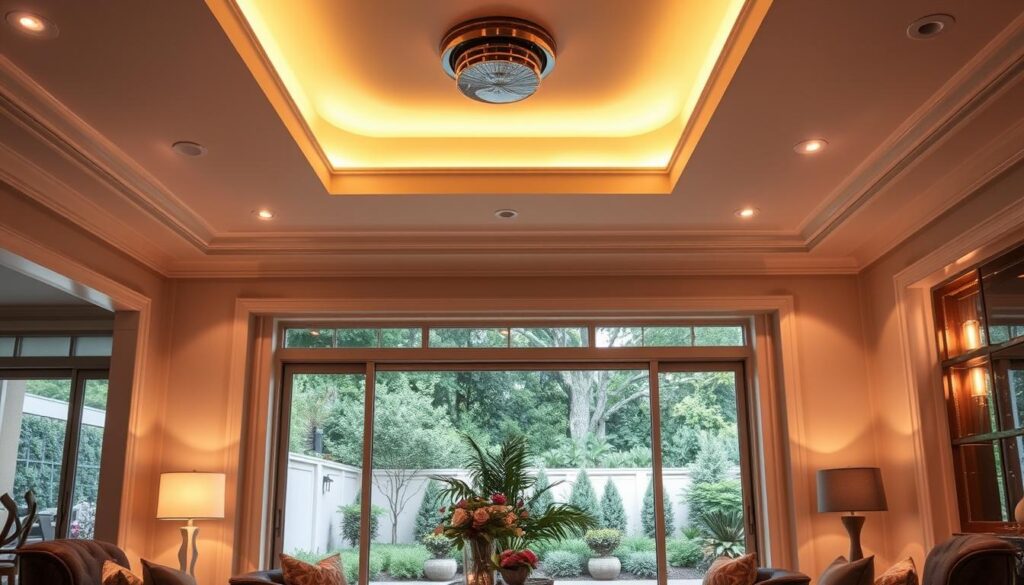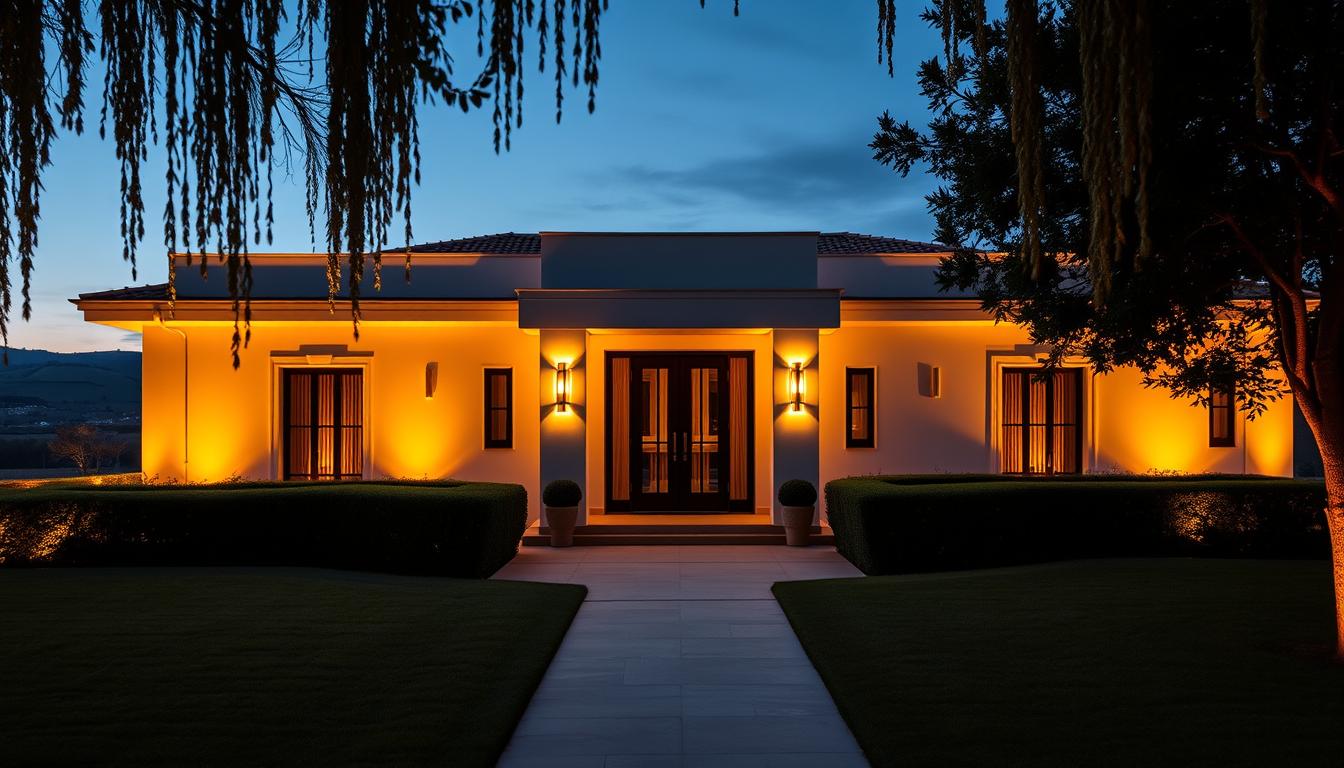Art Deco-style homes in the Penedès region are known for their unique architectural charm. To preserve their integrity while enhancing their functionality, wireless smart lighting systems can be a game-changer. These homes, with their characteristic one-story design, require thoughtful lighting solutions that complement their style.
By integrating smart home technology, homeowners can enjoy improved ambiance, energy efficiency, and convenience. The key is to select lighting systems that are not only functional but also aesthetically pleasing, blending seamlessly with the home’s décor.
Key Takeaways
- Wireless smart lighting enhances the ambiance and functionality of Art Deco homes.
- Smart home technology offers energy efficiency and convenience.
- Selecting the right lighting system is crucial for preserving architectural integrity.
- Proper installation is key to a seamless integration.
- Art Deco homes in the Penedès region can benefit significantly from smart lighting solutions.
The Unique Lighting Needs of Art Deco Homes in Penedès
In the Penedès region, Art Deco homes present a fascinating challenge for lighting designers who must balance preservation with innovation. These homes, known for their distinctive architectural style, require lighting solutions that not only highlight their unique features but also respect their historic integrity.
Architectural Characteristics of Art Deco in the Region
Art Deco architecture in Penedès is characterized by its use of geometric patterns and streamlined forms. These elements interact with light in complex ways, creating a dynamic visual experience.
Geometric Patterns and Their Interaction with Light
The geometric patterns found in Art Deco homes create a visually striking effect when illuminated. “Light dancing across these patterns can accentuate the architectural details, creating a sense of depth and texture,” as noted by lighting experts. Effective lighting design can enhance these features, making the home’s interior more engaging.
Typical Floor Plans of One-Story Penedès Homes
One-story Art Deco homes in Penedès often feature open floor plans that require versatile lighting solutions. These layouts typically include large living areas and expansive windows, necessitating lighting designs that can adapt to various activities and times of day.
Traditional Lighting Challenges in These Structures
Historic homes like those found in Penedès face specific lighting challenges, particularly when it comes to preserving their original character while incorporating modern lighting technology.
Limited Wiring Options in Historic Buildings
One of the primary challenges is the limited wiring options available in historic buildings. Retrofitting these homes with modern lighting can be difficult without compromising their architectural integrity.
Balancing Preservation with Modern Functionality
Balancing the need for modern lighting functionality with the preservation of historic features is a delicate task. It requires careful consideration of both the home’s original design and the homeowner’s current needs.
Understanding Wireless Smart Lights in Wine-Growing Regions

In regions known for their vineyards, like Penedès, wireless smart lighting systems offer a versatile and efficient solution. These systems are particularly beneficial in areas where the climate and rural setting present unique challenges.
Climate Considerations for Smart Lighting in Penedès
The Mediterranean climate of Penedès, characterized by hot summers and mild winters, affects the performance and longevity of smart lighting systems. Understanding these climate considerations is crucial for optimal system design.
Humidity and Temperature Fluctuations
High temperatures and humidity levels during the summer months can impact the durability of smart lighting components. Selecting systems with appropriate IP ratings and temperature resistance is essential.
Seasonal Lighting Needs in Vineyard Settings
Lighting needs in vineyard settings vary with the seasons. During harvest seasons, for instance, additional lighting may be required for evening activities, while in other seasons, ambient lighting might suffice.
Connectivity Challenges in Rural Wine Country
Rural areas like Penedès face connectivity challenges that can affect the performance of wireless smart lighting systems. Understanding these challenges is key to implementing effective solutions.
Distance from Urban Infrastructure
The distance from urban infrastructure can result in weaker internet connectivity, impacting the reliability of smart lighting systems that depend on stable internet connections.
Signal Interference from Terrain and Buildings
The hilly terrain and rustic buildings common in wine-growing regions can cause signal interference, affecting the communication between smart lighting devices.
Key Benefits of Smart Lighting for Art Deco Preservation
Smart lighting systems offer a multitude of benefits for Art Deco homes, particularly in preserving their unique architectural integrity. By leveraging advanced lighting technology, homeowners can enhance the visual appeal of their properties without compromising their historic character.
Enhancing Architectural Features Without Modification
One of the key advantages of smart lighting is its ability to highlight architectural features without making any physical modifications to the structure. This is particularly beneficial for Art Deco homes, known for their intricate designs and decorative elements.
Highlighting Decorative Elements with Directional Lighting
Directional lighting can be used to accentuate the decorative elements characteristic of Art Deco architecture, such as metallic motifs and geometric patterns.
Creating Depth in Characteristic Stepped Designs
Smart lighting can create depth in stepped designs, a hallmark of Art Deco style, by using layered lighting effects to emphasize the three-dimensional aspects of these architectural features.
Energy Efficiency While Maintaining Period Aesthetics
Smart lighting solutions, particularly those using LED technology, offer significant energy efficiency improvements while maintaining the period aesthetics of Art Deco homes.
LED Solutions That Mimic Vintage Lighting
LED lighting can be designed to mimic vintage fixtures, providing the warm glow associated with traditional lighting while reducing energy consumption.
Reducing Carbon Footprint in Historic Properties
By adopting energy-efficient smart lighting, homeowners can reduce the carbon footprint of their historic properties, contributing to a more sustainable future.
| Benefit | Description |
|---|---|
| Enhanced Architectural Features | Highlighting decorative elements without modification |
| Energy Efficiency | Reducing carbon footprint while maintaining period aesthetics |
Selecting the Right Smart Lighting System for Your Penedès Home

The key to a successful smart lighting installation in your Penedès home lies in selecting the right system. With the increasing popularity of smart home technology, various lighting solutions have emerged, each with its unique features and benefits.
Hub-Based vs. Bluetooth vs. Wi-Fi Systems
When choosing a smart lighting system, one of the primary decisions is whether to opt for a hub-based, Bluetooth, or Wi-Fi system. Each type has its advantages and disadvantages.
- Hub-Based Systems: These systems, such as Philips Hue, require a central hub to connect the lights to your smart home network. They offer robust performance and compatibility with various devices.
- Bluetooth Systems: Bluetooth-enabled lights connect directly to your smartphone or tablet, eliminating the need for a hub. They’re ideal for smaller setups and offer simplicity.
- Wi-Fi Systems: Wi-Fi lights connect directly to your home network, allowing for control via the internet. They offer flexibility but may have security implications.
Philips Hue and Similar Hub Ecosystems
Philips Hue is a well-known example of a hub-based ecosystem. It offers a wide range of products and compatibility with various smart home platforms. Philips Hue’s ecosystem is particularly appealing for its reliability and extensive feature set.
Standalone Bluetooth and Wi-Fi Options
For those who prefer not to invest in a hub, standalone Bluetooth and Wi-Fi lights are viable alternatives. Bluetooth options are great for small homes or apartments, while Wi-Fi lights offer more flexibility in terms of control and scheduling.
Compatibility with US Smart Home Ecosystems
Ensuring that your smart lighting system is compatible with popular US smart home ecosystems is crucial for a seamless experience.
| Smart Home Ecosystem | Compatibility |
|---|---|
| Amazon Alexa | Compatible with most smart lighting systems, including Philips Hue and Wi-Fi lights. |
| Google Home | Works with many smart lighting brands, offering voice control and scheduling. |
| Apple HomeKit | Offers secure integration for compatible devices, ideal for iOS users. |
Amazon Alexa and Google Home Integration
Both Amazon Alexa and Google Home offer robust integration with various smart lighting systems, allowing for voice control and smart routines.
Apple HomeKit for iOS Users
For iPhone users, Apple HomeKit provides a secure and seamless way to integrate smart lighting into their home ecosystem.
Installation Strategies for Minimal Structural Impact
Art Deco homes in Penedès require thoughtful installation strategies for smart lighting to preserve their architectural integrity. The unique characteristics of these homes demand a careful approach to integrating modern technology without compromising their historic charm.
Non-Invasive Mounting Solutions for Historic Surfaces
To maintain the original surfaces of Art Deco homes, it’s essential to use non-invasive mounting solutions. These methods prevent damage to the historic materials and finishes, ensuring that the smart lighting system complements the home’s aesthetic without altering its essence.
Removable Adhesives and Clips
One effective method is using removable adhesives and clips that can securely hold smart lighting fixtures in place without leaving residue or causing damage. These are particularly useful for surfaces that are sensitive or historically significant.
Freestanding and Furniture-Integrated Options
Another approach is to utilize freestanding smart lighting units or integrate lighting into existing furniture. This strategy not only minimizes the impact on the structure but also offers flexibility in rearranging the lighting setup as needed.
Concealing Hubs and Controllers in Art Deco Interiors
Concealing the hubs and controllers of smart lighting systems is crucial to maintaining the visual integrity of Art Deco interiors. Creative solutions are required to hide these necessary components while ensuring they remain accessible.
Decorative Covers That Complement Period Design
Using decorative covers that match the period design of the home is an effective way to conceal hubs and controllers. These covers can be custom-made to blend seamlessly with the Art Deco aesthetic, ensuring that the technology remains hidden from view.
Strategic Placement in Built-in Cabinetry
Another strategy is to place hubs and controllers within built-in cabinetry or other discreet locations. This approach not only conceals the devices but also keeps them protected and out of the way, maintaining the home’s original charm.
Creating Authentic Art Deco Lighting Scenes with Smart Technology

Smart lighting technology has revolutionized the way we experience Art Deco homes, allowing for authentic lighting scenes that enhance architectural features. By integrating smart technology into their lighting systems, homeowners can recreate the opulence and glamour of the Art Deco era while enjoying the benefits of modern convenience and energy efficiency.
Color Temperatures That Complement Art Deco Colors
Choosing the right color temperature is crucial for creating authentic Art Deco lighting scenes. Different elements of Art Deco decor call for specific lighting approaches. For instance, warm lighting can accentuate the richness of brass and wood elements, while cool lighting can highlight the sleekness of chrome and glass features.
Warm Lighting for Brass and Wood Elements
Warm white lighting (2700K-3000K) is ideal for highlighting brass fixtures and wooden accents that are characteristic of Art Deco design. This warm glow creates a cozy and inviting atmosphere, perfect for living areas and dining rooms.
Cool Lighting for Chrome and Glass Features
Cool white lighting (3500K-5000K) is better suited for showcasing chrome and glass elements, providing a crisp and modern contrast to the warmth of other materials. This lighting is particularly effective in kitchens and bathrooms where these materials are often used.
Programmable Lighting Patterns for Different Occasions
One of the key benefits of smart lighting is the ability to program different lighting scenes for various occasions. Whether it’s a dinner party or a quiet evening at home, smart lighting can be adjusted to suit the mood and activity.
Entertainment Presets That Enhance Social Spaces
For social gatherings, smart lighting can be programmed to create a vibrant and welcoming ambiance. Dimmable lights and color-changing LEDs can be used to set the tone for entertainment, making spaces more inviting and engaging.
Daily Routines That Follow Natural Rhythms
Smart lighting can also be programmed to follow natural daily rhythms, gradually adjusting light levels and color temperatures to simulate sunrise and sunset. This not only enhances the living experience but also supports circadian health.
| Lighting Scene | Color Temperature | Occasion |
|---|---|---|
| Warm Welcome | 2700K-3000K | Cozy evenings, dining |
| Modern Bright | 3500K-5000K | Task-oriented, kitchens, and workspaces |
| Party Mode | Variable | Entertainment, social gatherings |
By leveraging smart technology, homeowners can create a range of lighting scenes that not only honor the Art Deco aesthetic but also cater to modern lifestyles. This blend of vintage charm and contemporary functionality makes smart lighting an invaluable tool for Art Deco enthusiasts.
Integrating Smart Lighting with Vineyard Views
Penedès homeowners can elevate their Art Deco living spaces by integrating smart lighting with the beautiful vineyard views. This integration not only enhances the aesthetic appeal of the property but also improves functionality and energy efficiency.
Optimizing Indoor-Outdoor Lighting Transitions
Seamless transitions between indoor and outdoor lighting are crucial for homes with vineyard views. This can be achieved through strategic lighting design and smart technology.
Window-Adjacent Lighting Strategies
Placing smart light bulbs near windows can help create a harmonious transition between indoor and outdoor lighting. For instance, Philips Hue bulbs can be programmed to adjust their brightness based on the natural light available.
Patio and Terrace Integration
Smart lighting on patios and terraces can be synchronized with indoor lighting to create a cohesive ambiance. This can be particularly appealing during evening gatherings or when enjoying the vineyard views.
Automated Adjustments Based on Natural Light Patterns
Automating lighting adjustments based on natural light patterns can significantly enhance the living experience. This includes programming lights to adjust based on sunrise and sunset times, as well as seasonal changes in daylight hours.
Sunrise and Sunset Triggers
Setting lighting scenes to trigger at sunrise and sunset can create a natural and welcoming atmosphere. For example, a “sunset” scene can gradually dim indoor lights while brightening outdoor lights.
Seasonal Programming for Changing Daylight Hours
Adjusting lighting schedules seasonally ensures that the lighting remains optimal throughout the year. This can be done manually or through automated systems that adjust based on the time of year.
| Season | Sunrise/Sunset Times | Lighting Adjustments |
|---|---|---|
| Spring | Earlier sunrise, later sunset | Dim indoor lights later, brighten outdoor lights earlier |
| Summer | Late sunrise, late sunset | Keep indoor lights dimmer longer, outdoor lights brighter |
| Autumn | Later sunrise, earlier sunset | Brighten indoor lights earlier, dim outdoor lights earlier |
| Winter | Late sunrise, early sunset | Keep indoor lights brighter longer, outdoor lights adjusted for safety |
By implementing these strategies, homeowners in Penedès can enjoy a more integrated, efficient, and beautiful lighting system that complements their vineyard views.
Overcoming Wi-Fi Limitations in Rural Penedès Properties
Smart lighting in rural Penedès homes requires overcoming Wi-Fi limitations for optimal performance. Rural properties often face unique connectivity challenges due to their location and the region’s topography.
Mesh Network Solutions for Consistent Coverage
One effective way to address Wi-Fi limitations is by implementing mesh network solutions. These systems use multiple nodes to create a network of interconnected Wi-Fi access points, ensuring consistent coverage throughout the property.
Eero and Similar Mesh Systems for Historic Homes
Systems like Eero offer robust mesh networking capabilities that can be particularly beneficial for historic homes. They provide a reliable and easy-to-manage solution for maintaining strong Wi-Fi connectivity.
Optimal Router Placement in Thick-Walled Structures
In thick-walled structures common in Penedès, optimal router placement is crucial. Positioning routers in central locations or using range extenders can help improve signal strength.
Backup Systems During Connectivity Interruptions
Even with robust mesh networks, connectivity interruptions can occur. Implementing backup systems ensures that smart lighting remains functional during such events.
Local Control Options When Internet Fails
Local control options allow homeowners to control their smart lighting systems even without an active internet connection. This can be achieved through hub-based systems or devices that support local control protocols.
Battery Backup Considerations
Battery backup systems can provide power to critical components of smart lighting systems during power outages. This ensures continued functionality and can be particularly important for safety and security lighting.
| Backup System Type | Functionality During Outage | Cost Consideration |
|---|---|---|
| Local Control | Maintains control without internet | Moderate |
| Battery Backup | Provides power during outages | Higher |
| Mesh Network | Enhances overall network reliability | Moderate to Higher |
Maintenance and Upgradeability Considerations
To ensure optimal performance, it’s crucial to consider maintenance and upgradeability when selecting a smart lighting system for your Art Deco home. The longevity of your smart lighting investment depends on various factors, including weather resistance and future-proofing capabilities.
Weather-Resistant Options for Mediterranean Climate
The Mediterranean climate in Penedès poses specific challenges for smart lighting systems, including high temperatures and humidity. Selecting weather-resistant options is crucial for outdoor and semi-outdoor spaces.
IP Ratings for Outdoor and Semi-Outdoor Spaces
IP ratings are essential for determining the level of protection against solid objects and water. For outdoor spaces, consider lights with an IP65 rating or higher to ensure durability.
Dust Protection in Wine Country Environments
In wine country environments, dust protection is vital to maintain the longevity of your smart lighting system. Look for systems with dust-tight designs or protective coatings to minimize maintenance.
Future-Proofing Your Investment
Future-proofing your smart lighting investment involves selecting systems that can adapt to evolving technologies. This includes considering systems with regular software updates and modular components.
Selecting Systems with Regular Software Updates
Regular software updates ensure that your smart lighting system remains compatible with the latest technologies and security protocols. Opt for manufacturers that provide frequent updates and support.
Modular Components for Easy Replacement
Modular components allow for easy replacement of faulty or outdated parts, reducing electronic waste and minimizing maintenance costs. Consider systems with modular designs for future upgrades.
| Feature | Importance | Benefit |
|---|---|---|
| Weather Resistance | High | Longevity in Mediterranean climate |
| Regular Software Updates | High | Compatibility with latest technologies |
| Modular Components | Medium | Ease of maintenance and upgrade |
Conclusion: Harmonizing Modern Technology with Art Deco Heritage
Optimizing wireless smart lighting systems for Art Deco-style one-story homes in Penedès requires a thoughtful approach to preserving architectural heritage while embracing modern technology. By understanding the unique lighting needs of these homes and selecting the right smart lighting systems, homeowners can create a harmonious blend of past and present.
The key to achieving this harmony lies in implementing smart lighting solutions with minimal structural impact. This involves choosing non-invasive mounting solutions, concealing hubs and controllers, and creating authentic Art Deco lighting scenes with smart technology. By doing so, homeowners can enhance their Art Deco heritage while enjoying the benefits of modern technology.
The result is a smart lighting harmony that complements the unique characteristics of Art Deco homes in Penedès. This synergy between traditional aesthetics and modern functionality not only preserves the region’s architectural heritage but also enhances the overall living experience. As technology continues to evolve, homeowners can future-proof their investments by selecting adaptable smart lighting systems.
FAQ
What are the benefits of using wireless smart lighting systems in Art Deco-style homes?
Wireless smart lighting systems offer several benefits, including enhanced architectural features without modification, energy efficiency, and the ability to create authentic Art Deco lighting scenes.
How do I choose the right smart lighting system for my Penedès home?
When selecting a smart lighting system, consider factors such as the type of system (hub-based, Bluetooth, or Wi-Fi), compatibility with US smart home ecosystems (e.g., Amazon Alexa, Google Home, Apple HomeKit), and the specific lighting needs of your Art Deco home.
Can I install smart lighting systems in historic homes without causing damage?
Yes, non-invasive mounting solutions, such as removable adhesives and clips, and freestanding or furniture-integrated options, can minimize structural impact. Additionally, concealing hubs and controllers in decorative covers or built-in cabinetry can maintain the period design.
How do I optimize indoor-outdoor lighting transitions in my Penedès home?
Strategies for optimizing indoor-outdoor lighting transitions include window-adjacent lighting, patio and terrace integration, and automated adjustments based on natural light patterns, such as sunrise and sunset triggers and seasonal programming.
What are the best smart lighting options for Art Deco homes in rural areas with limited Wi-Fi connectivity?
Mesh network solutions, such as Eero, can provide consistent coverage, while local control options and battery backup considerations can ensure continued functionality during connectivity interruptions.
How can I future-proof my smart lighting investment?
Selecting systems with regular software updates and modular components for easy replacement can help future-proof your investment. Additionally, considering weather-resistant options and dust protection can ensure the longevity of your smart lighting system.
Can smart lighting systems be integrated with existing smart home ecosystems?
Yes, many smart lighting systems are compatible with popular smart home platforms like Amazon Alexa, Google Home, and Apple HomeKit, allowing for seamless integration and control.
What are the key considerations for maintaining smart lighting systems in the Penedès region?
Maintenance considerations include weather-resistant options, IP ratings for outdoor and semi-outdoor spaces, and dust protection in wine country environments.
